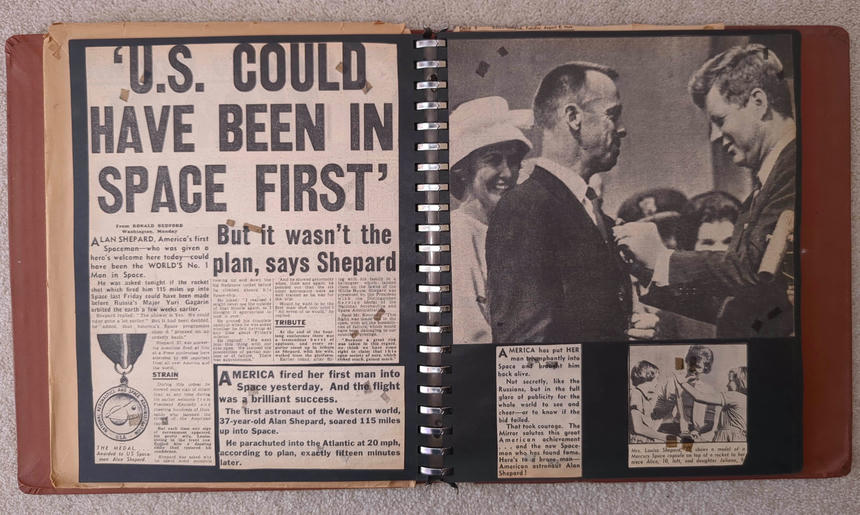Scrapbook 1: May 1961 — Alan Shepard

‘U.S. COULD HAVE BEEN IN SPACE FIRST’
From RONALD BEDFORD Washington, Monday
But it wasn’t the plan, says Shepard
ALAN SHEPARD, America’s first Spaceman—who was given a hero’s welcome here today—could have been the WORLD’S No. 1 Man in Space.
He was asked tonight if the rocket shot which fired him 115 miles up into Space last Friday could have been made before Russia’s Major Yuri Gagarin orbited the earth a few weeks earlier.
Shepard replied: “The answer is Yes. We could have gone a lot earlier.” But it had been decided, he added, that America’s Space programme should “proceed on an orderly basis.”
Shepard, 37, was answering questions fired at him at a Press conference here attended by 400 reporters from all over America and the world.
STRAIN
During this ordeal he showed more sign of strain than at any time during his earlier welcome from President Kennedy and cheering hundreds of thousands who jammed the streets of the American capital.
But each time any sign of nervousness appeared, his pretty wife, Louise, sitting in the front row, flashed him a dazzling smile that restored his confidence.
Shepard was asked why he spent some moments looking up and down the big Redstone rocket before he climbed aboard his Space-ship.
He joked: “I realised I might never see the outside of that missile again, so I thought it appropriate to look it over.”
He proved his complete candour when he was asked whether he felt nervous at any time about Friday’s mission.
He replied: “We went into this thing with our eyes open. We realised the possibilities of partial success or of failure. There was apprehension.”
And he showed generosity when, time and again, he pointed out that the six other astronauts were as well trained as he was for the trip.
Would he want to be the first man shot into orbit? “All seven of us would,” he replied.
TRIBUTE
At the end of the hour-long conference there was a tremendous burst of applause, and every reporter stood up in tribute as Shepard, with his wife, walked from the platform.
Earlier today, after flying with his family in a helicopter which landed them on the lawns of the White House, Shepard was presented by the President with the Distinguished Service Medal of the National Aeronautics and Space Administration.
Said Mr. Kennedy: “This flight was made out in the open, with all the possibilities of failure, which would have been damaging to our country’s prestige.
“Because a great risk was taken in this regard, we think we have some right to claim that this open society of ours, which risked much, gained much.”
AMERICA fired her first man into Space yesterday. And the flight was a brilliant success.
The first astronaut of the Western world, 37-year-old Alan Shepard, soared 115 miles up into Space.
He parachuted into the Atlantic at 20 mph, according to plan, exactly fifteen minutes later.
THE MEDAL. . . . Awarded to US Spaceman Alan Shepard.
AMERICA has put HER man triumphantly into Space and brought him back alive.
Not secretly, like the Russians, but in the full glare of publicity for the whole world to see and cheer—or to know if the bid failed.
That took courage. The Mirror salutes this great American achievement . . . and the new Spaceman who has found fame. Here’s to a brave man—American astronaut Alan Shepard!
Mrs. Louise Shepard, 37, shows a model of a Mercury Space capsule on top of a rocket to her niece Alice, 10, left, and daughter Juliana, 9